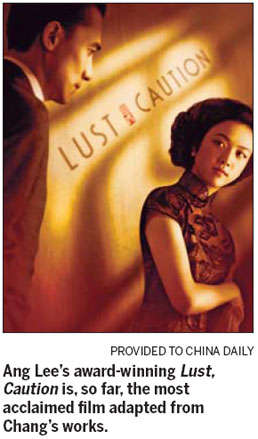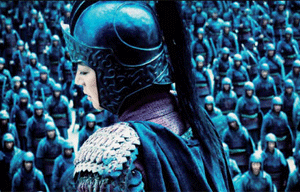'Rose is a rose is a rose is a rose'
Updated: 2011-09-30 08:26
By Liu Wei (China Daily)
|
|||||||||
Eileen Chang's works are roses with thorns for filmmakers.
 |
Her fictions, the best known being love tales of 1930s-40s Shanghai and Hong Kong, were beautifully written with savvy observations of relationships between men and women. Against the backdrop of a chaotic era, the romance and scheming seem suited to the screen.
Yet her language, so smart and sharp, is an obstacle for filmmakers. And her fans would sneer at any adaptation they think stains the name of the writer.
So far the most acclaimed film adapted from Chang's works, among both critics and fans, is Ang Lee's Lust, Caution.
The film tells the story of a student-turned-spy who falls in love with her target and saves his life at the price of her own.
The film, especially its three scenes of explicit sex, created a huge stir. Controversy about whether the heroine should save her lover, a traitor of the country, has also been a factor.
Lee insists the sex scenes were a necessary part of the film, which discusses the complexity of humanity.
At the Venice International Film Festival in 2007, a Golden Lion recognized the film's seriousness and artistic merit.
The casting of lead actress Tang Wei and veteran Tony Leung was widely applauded, while the story subtly combines Chang's sharpness and Lee's delicacy.
Female Hong Kong director Ann Hui is another brave filmmaker who has adapted Chang's works.
As early as in 1984, she had turned to Love in a Fallen City, one of Chang's most loved stories.
Set in 1940s Hong Kong, it revolves around a divorced woman and a womanizer, who realize they need each other to survive war-torn Hong Kong.
Hui was criticized for casting lead actress Cora Miao. Hong Kong critic/filmmaker Evans Chan calls her "a disaster" and adds her face is a picture of just "fear and blankness".
Hui did not adapt a Chang work again until 1997. She maintains the original storyline of Chang's Eighteen Springs, and casts many established actors, such as Anita Mui, Leon Lai and Ge You.
Her strategy worked. The film was well-received and won seven nominations at the 17th Hong Kong Film Awards.
Another Hong Kong director, Stanley Kwan, tries to keep Chang's beloved language not only in the dialogue, but also in the subtitles and voiceover.
His 1994 film Red Rose White Rose divided Chang's fans but won him a nomination for Golden Bear at the Berlin International Film Festival.
Chang did have the chance to see a film adapted from her work. In 1984, Ann Hui's Love in a Fallen City was released in Los Angeles, where Chang lived before she died in 1995. Whether the enthusiastic film fan and scriptwriter went to see it, however, is unknown.











